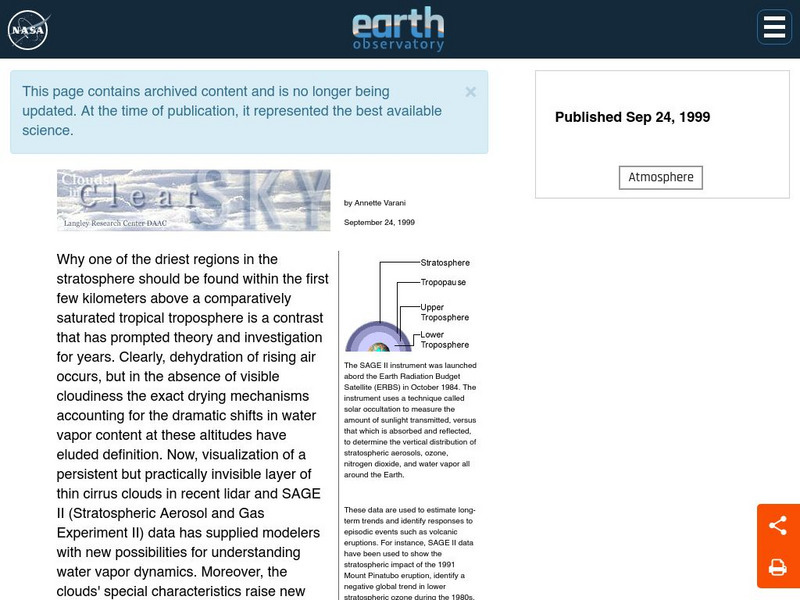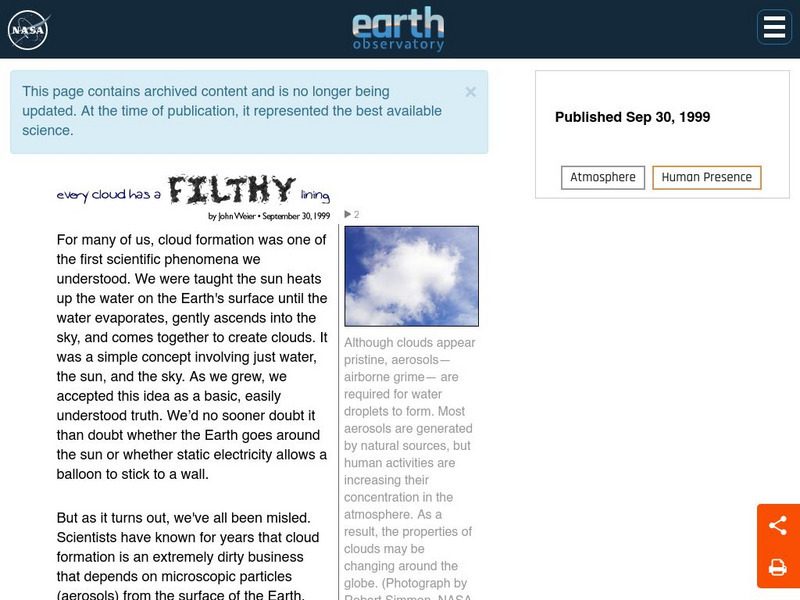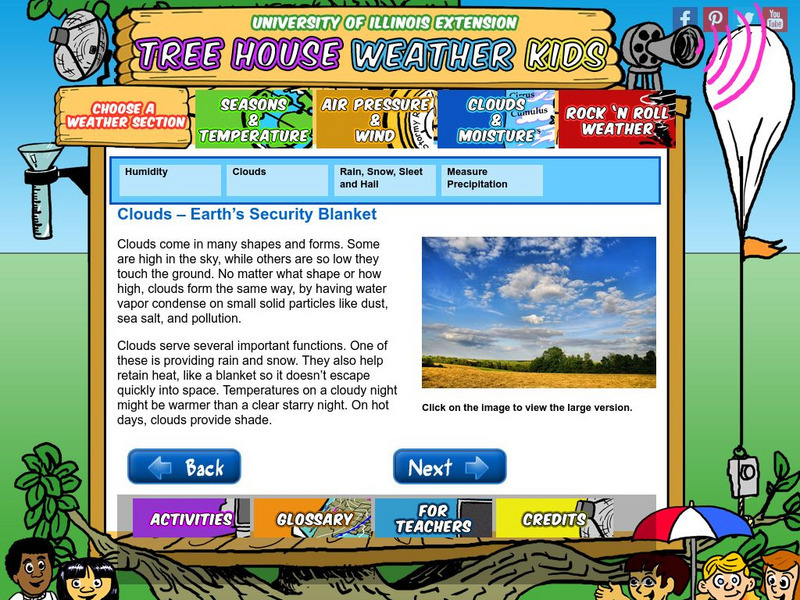American Geosciences Institute
American Geosciences Institute: How Are Clouds Formed?
A brief, scientific explanation of how clouds are formed.
CK-12 Foundation
Ck 12: Physical Science: Deposition
[Free Registration/Login may be required to access all resource tools.] Definition of deposition and examples of deposition in nature.
National Earth Science Teachers Association
Windows to the Universe: Cloud Types
Windows to the Universe provides a table with information about each cloud group, base height of each of the cloud groups, and links to information on the individual cloud types associated each group.
CK-12 Foundation
Ck 12: Earth Science: Clouds
[Free Registration/Login may be required to access all resource tools.] Describes how clouds form, and describes different types of clouds.
NASA
Nasa: Space Place: Unscramble the Clouds
In this slider picture puzzle, try and put the pieces in the correct place to see all types of different clouds.
Merriam-Webster
Merriam Webster: Dictionary Illustration: Cloud
This is basic cloud chart illustrating shape and relative altitude of ten key cloud types. Scroll down to the bottom for the list of cloud types by name.
Annenberg Foundation
Annenberg Learner: Weather: The Water Cycle
An article about the water cycle and the role that water plays in cloud formation.
Dan Satterfield
Wild Weather: Dan's Wild Wild Weather Page
A site to find out anything you want to know about weather, including clouds, tornadoes, satellites, radar, wind, climate, and more. Suitable for all ages. Also includes games, quizzes, and teacher resources.
NASA
Nasa Earth Observatory: Changing Global Cloudiness
Learn what clouds are made of and how they form. Read reports from several different cloud observations and how the clouds effect climate.
NASA
Nasa Earth Observatory: Clouds in a Clear Sky
This article introduces the different layers of the atmosphere and the clouds that are formed there. Scientists use instruments such as the SAGE 11 that help to measure amounts of sunlight, water vapor, and other conditions that affect...
NASA
Nasa Earth Observatory: Every Cloud Has a Filthy Lining
This article discusses what clouds are made of, including the dirty particles in them called aerosols. Learn about the natural and man-made sources of aerosols.
Enchanted Learning
Enchanted Learning: Zoom Astronomy: The Earth's Atmosphere
Site provides information on the Earth's atmosphere as well as offers additional information about Earth.
Sophia Learning
Sophia: Bill Nye Demonstration: Cloud in a Bottle
Watch and learn with Bill Nye the Science Guy as he demonstrates how clouds form in the atmosphere using a glass bottle and a bicycle pump. [2:10]
Other
Boatsafe.com: How to Be a Storm Spotter
How can you learn to be a storm spotter? This site highlights information on the different types of clouds found in the different types of weather. View the photos of the various clouds. Scroll down to a summary of the information you...
University Corporation for Atmospheric Research
Ucar: Cloud Types
Diagram shows the different types of clouds that are located in the sky. Click on each clouds name for images and further information.
CommonLit
Common Lit: "What Are Clouds?" by Nasa
This informational text explains the formation of different clouds and how they contribute to different types of weather on Earth. A specific purpose for reading and vocabulary notes are provided. This site offers links to paired texts,...
Other
Gorp: Using Clouds to Forecast the Weather
This resource provides information on the four main types of clouds that form in the atmosphere. There are high clouds, middle clouds, low clouds and clouds with vertical development.
University of Illinois
University of Illinois Extension: Tree House Weather Kids: Clouds and Moisture: Clouds: Earth's Security Blanket
Animated resource helps young researchers understand clouds, cloud formation, and types of clouds.
University Corporation for Atmospheric Research
Ucar: Clouds
Weather site for kids highlights clouds. Discover how they are formed, learn to make fog in a jar, read about the damage they can cause and take a cloud quiz.
CK-12 Foundation
Ck 12: Fifth Grade Science: Earth Science: Weather and Water in the Atmosphere
[Free Registration/Login may be required to access all resource tools.] Discusses what causes weather, what humidity is and its role in the weather, how clouds are classified, and types of precipitation and how they form.
Discovery Education
Discovery Education: Weather Maps
This site provides a lesson plan in which groups of students will each investigate a different type of weather map use for weather forecasting. Also includes discussion questions, extension ideas, and links to additional sites for more...
Better Lesson
Better Lesson: Identifying and Writing Facts About Clouds
Students will be able to identify and learn about clouds.
University Corporation for Atmospheric Research
Ucar: Clouds in the Air: Why Are They There?
An experiment that demonstrates why there are clouds in the sky. Start with air, invisible water vapor, particles we call condensation nuclei, and air pressure...the cloud comes later!
Alabama Learning Exchange
Alex: How Clouds Form
Cloud formation results when warm, humid air rises and cools, causing the water vapor in the air to condense and form clouds. In this lesson, students will conduct an activity that demonstrates how this occurs.This lesson plan was...



















